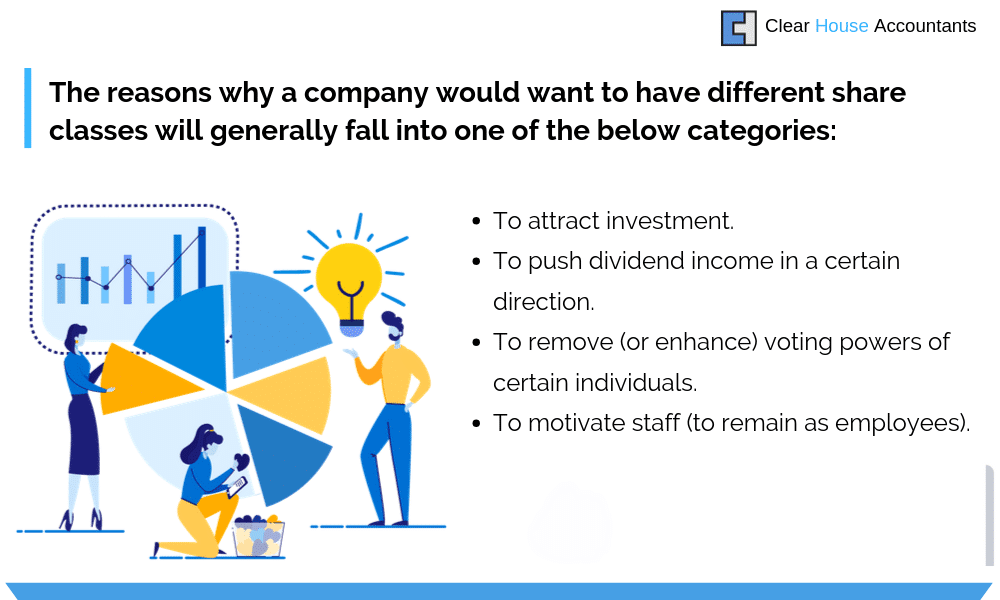Learn all about shares and share structures if you are thinking about starting a new company
Who is a shareholder?
A shareholder is referred to as a person, company, or organization who owns shares in a limited company. The number of shares held by a shareholder indicates the percentage ownership of that person in a given company. They are legally entitled to receive a percentage of profits that is proportional to the number of shares they hold and the right to ownership and dividends each share carries. Shareholders are also known as ‘Members’, ‘subscribers’ or ‘stockholders’.
Shareholders owning more than 50% of shares in a limited company are called the ‘majority shareholders’, and those owning less than 50% of shares are referred to as the ‘minority shareholders’
Who can be a shareholder?
Any person, company, or organization can be a shareholder, given that the person or entity owns at least one share in a limited company and is not legally barred from holding shares.
How many shareholders should be on board to register your company legally?
As per the requirements, there should be at least one shareholder required to register a limited company with Companies House. There is no limit to the number of shareholders a company can have. If you are not sure about how to add a shareholder or structure of your new company you should find yourself a good startup accountant or a competitive online accountant.
If a company is concerned about its confidentiality. You can also appoint some nominee shareholders who will appear publicly on the records.
Nominee Shareholder in the UK: Confidential Ownership and Transparency
Try searching for the term Accountants in London for a quick list of the best accounting firms in London.
Are shareholders the same as directors?
No, because shareholders become legal owners of a company through acquiring shares. Shareholders hire directors to manage the financial, marketing, and operational activities of the company. However, in many instances, small businesses or startups end up having a single shareholder who acts as the director of the company as well. If you want to appoint new directors or issue shares to shareholders, a highly competent company secretarial company or an accounting firm with highly trained accountants can be extremely valuable.
What are the responsibilities of a shareholder?
Being a shareholder brings with it a variety of responsibilities and obligations that have to be met. Here are some of the primary responsibilities of a shareholder:
- Shareholders can, by right to ownership, break down the work structure and assign different responsibilities and duties to the appointed directors. However, the articles of association have to be followed. They can be based on their shareholding and the rules mentioned in the articles of association, hiring or firing anyone on the board.
- It is the shareholders’ responsibility to ensure the business has enough resources to make payroll for their directors.
- Any decision that lies beyond the power of the directors has to be taken by the shareholders, which may include changing the company’s constitution.
- Shareholders with a majority holding will have control of the board, which gives them the responsibility to assess and approve all of the financial statements of their limited company.
If you are unsure about how the administration or accounting for limited company works or impacts you as a director or a shareholder, you should speak to a specialist.

What do you need to know about shares?
A share is a unit of ownership in a limited company that entitles the shareholder to derive income that is proportional to the number of shares they hold and the right they carry from the company’s profits and are entitled to obligations on the company’s debts and losses. The number and value of the shares particular shareholders hold is the primary determinant of their percentage ownership in a company.
What is the limit of shares a company can issue?
There is no upper limit to how many shares a company can issue; a limited company can issue as many shares as they want during or after the registration process. However, a company is required to issue at least one share. This is usually witnessed in a limited company when the shareholder is the sole owner and the director himself. If you are unsure about how many shares to issue, what to value them, and how to record them, you should speak to your accountant immediately. If you do not have one, look for an Accountant in London for a small business that also specialises in Company Secretarial Services.
What types of shares can be issued?
The profit and voting rights of a shareholder may be dependent upon the type of share they hold. A company may issue ‘ordinary’ shares of equal value that guarantee every shareholder’s entitlement to equal voting and profit rights. Similarly, the company may issue different types of shares to confer different voting and profit rights to different shareholders.
Share classes that fall under different categories of types of share are:
- Ordinary shares
- Preference shares
- Deferred ordinary shares
- Cumulative preference shares
- Non-voting ordinary shares
- Redeemable shares
- Redeemable preference shares
Why do companies prefer to have different share classes?
Companies prefer to have different share classes due to a number of reasons:
- They want to attract more investment
- They want to enhance or abolish the voting powers of particular individuals
- They want to assign limited profit rights to certain individuals
- They want to push income derived from dividends in a certain direction
- They want to ensure that their staff is always motivated and remain as employees
What makes up the value of a single share?
A share has a market value and a nominal value; understanding the difference between the two is extremely important.
Nominal value
Nominal value, often referred to as the ‘face’ or ‘par’ value, is an arbitrary value allotted to that particular unit of ownership (Share). The nominal value, which is usually 1 or less, is the sum that members are legally required to pay towards the company’s debts or pay when the company is suffering from losses. ‘Limited liability of shareholders in the company is represented by the nominal value of the shares they hold.
Market value
The market value of a share varies from its nominal value and represents the actual worth of a share when it is sold or issued.
Share premium
Share premium is the difference between the nominal value and market value.

Can accountants help individuals register a company with different share classes?
Yes, try speaking to your accountants; if you do not have one, look for one. Having the expertise of a small business accountant at your disposal can mean the difference between setting up a successful share structure or not.
Clear House Accountants are specialist accountants in London who have years of experience working with startups and growing businesses, helping them set up effective companies and share structures. With our expertly trained accountants, we can guarantee you scalable, long-term solutions.









































































